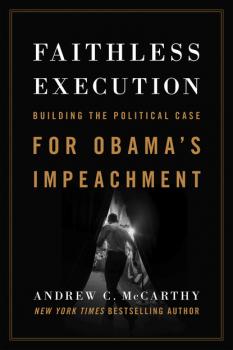Ingram
Все книги издательства IngramFaithless Execution
We still imagine ourselves a nation of laws, not of men. This is not merely an article of faith but a bedrock principle of the United States Constitution. Our founding compact provides a remedy against rulers supplanting the rule of law, and Andrew C. McCarthy makes a compelling case for using it.The authors of the Constitution saw practical reasons to place awesome powers in a single chief executive, who could act quickly and decisively in times of peril. Yet they well understood that unchecked power in one person’s hands posed a serious threat to liberty, the defining American imperative. Much of the debate at the Philadelphia convention therefore centered on how to stop a rogue executive who became a law unto himself.The Framers vested Congress with two checks on presidential excess: the power of the purse and the power of impeachment. They are potent remedies, and there are no others.It is a straightforward matter to establish that President Obama has committed “high crimes and misdemeanors,” a term signifying maladministration and abuses of power by holders of high public trust. But making the legal case is insufficient for successful impeachment, leading to removal from office. Impeachment is a political matter and hinges on public opinion.In Faithless Execution, McCarthy weighs the political dynamics as he builds a case, assembling a litany of abuses that add up to one overarching offense: the president’s willful violation of his solemn oath to execute the laws faithfully. The “fundamental transformation” he promised involves concentrating power into his own hands by flouting law—statutes, judicial rulings, the Constitution itself—and essentially daring the other branches of government to stop him. McCarthy contends that our elected representative are duty-bound to take up the dare.
Men on Strike
American society has become anti-male. Men are sensing the backlash and are consciously and unconsciously going “on strike.” They are dropping out of college, leaving the workforce and avoiding marriage and fatherhood at alarming rates. The trend is so pronounced that a number of books have been written about this “man-child” phenomenon, concluding that men have taken a vacation from responsibility simply because they can. But why should men participate in a system that seems to be increasingly stacked against them? As Men on Strike demonstrates, men aren’t dropping out because they are stuck in arrested development. They are instead acting rationally in response to the lack of incentives society offers them to be responsible fathers, husbands and providers. In addition, men are going on strike, either consciously or unconsciously, because they do not want to be injured by the myriad of laws, attitudes and hostility against them for the crime of happening to be male in the twenty-first century. Men are starting to fight back against the backlash. Men on Strike explains their battle cry.
Liberal Oasis
Israel has become the most reviled of states; and the international Left—world church bodies, British labor unions, American human rights groups and the like—has been especially vociferous in its condemnations. But, ironically, Israel's humane accomplishments in the very realms that the Left most cherishes compare favorably with those of most other countries. This is especially true if Israel is compared with other countries in its region, or with other countries under external duress, or with the other states born after World War Two that have so often stumbled at nation-building. In Liberal Oasis: The Truth About Israel, Joshua Muravchik marshals a wealth of hard data, livened with telling anecdotes, to show that in the achievement of liberty, equality, fraternity, Israel is one of the world's most remarkable and admirable societies.
What Doomed Detroit
Many cities have struggled with the decline of key industries, from Philadelphia’s shipyards to New York’s textile industry, but Detroit—which is now in bankruptcy—is both a victim of the decline of the Michigan automobile industry and a cause of it. A city with a history of civil disorder—it is the only American city occupied on three separate occasions by federal troops—its poisonous blend of race-based politics and union domination has left it impoverished and diminished. Once the fourth-largest city in the country, it is today smaller than Fort Worth. Once the nation’s most prosperous city, it is today the poorest. Even in its reduced state, it is the largest U.S. city ever to file for bankruptcy—and yet its city payroll maintains twice as many government employees per resident as does San Jose. More terrifying is the fact that the imbalance between public-sector consumption and private-sector production that helped make Detroit what it is today is by no means limited to the Motor City—in fact, there are four large U.S. cities that are in arguably worse shape. Detroit is not just a case study, but a portent.
The Truth About the IRS Scandals
The IRS scandal is far more complicated than it appears—and more pernicious. Its roots go back to its founding but modern technology has accelerated the harm that a few malicious IRS administrators can do to their political enemies.Lois Lerner, the woman at the center of the congressional probe into the targeting of conservative groups, called the Tea Party “very dangerous” and hoped it could be used to roll back a pro-free speech court case, Citizens United v. Federal Election Commission (2010). Lerner conspired with her old colleagues at the FEC to leak confidential tax information. She even acted to retroactively award tax exempt status to politically connected charities while targeting for destruction those committed to truth.Leaking sensitive information about individuals and organizations is par for the course for committed ideologues in the Obama Administration who rely on an apparatus of far left think tanks and their allies in the press to spin narratives that keep the Washington elite in control. The far left’s friends in Congress and the IRS, meanwhile, are doing everything they can to make sure the truth is never brought to light by spinning about what really happened.This Broadside will expose the tax collector conspiracy that kneecapped the Tea Party, one of the greatest citizen uprisings in American history, and educates citizens about what has been done so that they might prevent it from ever happening again. Knowledge, particularly of the arcane regulations of the tax code, is power; a lawless tax collector class can only be curtailed by an active citizenry.The Truth About the IRS Scandals is necessary because only the truth will set Americans free.
Renewal
In the wake of the clergy abuse scandal of the last decade, many media commentators predicted the “end” of the Catholic priesthood. Demands for an end to celibacy, coupled with calls for women’s ordination, dominated discussions on the effectiveness of the Catholic Church in America. Renewal argues that rather than a decline of the priesthood and a diminishing influence of the Catholic Church, we are living in a time of transformation and revitalization. The aging generation of progressives that continues to lobby Church leaders to change Catholic teachings on reproductive rights, same-sex marriage and women's ordination is being replaced by younger men and women who are attracted to the Church because of the very timelessness of its teachings.
America-Lite
America-Lite (where we all live) is just like America, only turned into an amusement park or a video game or a supersized Pinkberry, where the past and future are blank and there is only a big NOW. How did we come to expect no virtue and so much cynicism from our culture, our leaders—and each other?In this refreshingly judgmental book, David Gelernter connects the historical dots to reveal a stealth revolution carried out by post-religious globalist intellectuals who, by and large, “can’t run their own universities or scholarly fields, but are very sure they can run you.” These imperial academics have deployed their students into the top echelon of professions once monopolized by staid and steady WASPs. In this simple way, they have installed themselves as the new designated drivers of American culture.Imperial academics live in a world of theory; they preach disdain for mere facts and for old-fashioned fact-based judgments like true or false. Schoolchildren are routinely taught theories about history instead of actual history—they learn, for example, that all nations are equally nice except for America, which is nearly always nasty.With academic experts to do our thinking for us, we’ve politely shut up and let second-raters take the wheel. In fact, we have handed the keys to the star pupil and teacher’s pet of the post-religious globalist intellectuals, whose election to the presidency of the United States constituted the ultimate global group hug.How do we finally face the truth and get back into the driver’s seat? America-Lite ends with a one-point plan.
Why We Won't Talk Honestly About Race
In the Age of Obama, the ugly charge of racism is more prevalent than ever. Why? Because telling the truth about racial profiling, crime, the social fallout of single parent homes, and the ways racial preferences distort the very meaning of equity and justice would mean facing up to the soul-destroying pathologies of urban black culture. Instead, black leaders and their guilty white allies focus tirelessly on historic oppression and the supposed need for more government aid, and demonize those who challenge their shopworn views as—what else?—racist.In Why We Won't Talk Honestly About Race (formerly No Matter What . . . They'll Call This Book Racist), Harry Stein attacks the rigid prohibitions that have long governed the conversation about race, not to offend or shock (though they certainly will) but to provoke the serious thinking that liberal enforcers have until now rendered impossible. Stein examines the ways in which the regime of racial preferences has sown division, corruption, and resentment in this country. He pays special attention to the stifling falsehood that it is racism that continues to mire millions of underclass blacks in physical and spiritual poverty. By far the greater problem, says Stein, is the culture of destructive attitudes and behaviors that denies those in its grip the means of escape.For all the remarkable progress this country has made on race in the past half century, liberals insist, for their own political and psychological purposes, on clinging to the notion of America as irredeemably racist. All of us—and especially black people—for too long have been living with the terrible consequences of that cruel canard.
Unlearning Liberty
For over a generation, shocking cases of censorship at America’s colleges and universities have taught students the wrong lessons about living in a free society. Drawing on a decade of experience battling for freedom of speech on campus, First Amendment lawyer Greg Lukianoff reveals how higher education fails to teach students to become critical thinkers: by stifling open debate, our campuses are supercharging ideological divisions, promoting groupthink, and encouraging an unscholarly certainty about complex issues.Lukianoff walks readers through the life of a modern-day college student, from orientation to the end of freshman year. Through this lens, he describes startling violations of free speech rights: a student in Indiana punished for publicly reading a book, a student in Georgia expelled for a pro-environment collage he posted on Facebook, students at Yale banned from putting an F. Scott Fitzgerald quote on a T shirt, and students across the country corralled into tiny “free speech zones” when they wanted to express their views.But Lukianoff goes further, demonstrating how this culture of censorship is bleeding into the larger society. As he explores public controversies involving Juan Williams, Rush Limbaugh, Bill Maher, Richard Dawkins, Larry Summers—even Dave Barry and Jon Stewart—Lukianoff paints a stark picture of our ability as a nation to discuss important issues rationally. Unlearning Liberty: Campus Censorship and the End of American Debate illuminates how intolerance for dissent and debate on today’s campus threatens the freedom of every citizen and makes us all just a little bit dumber.









